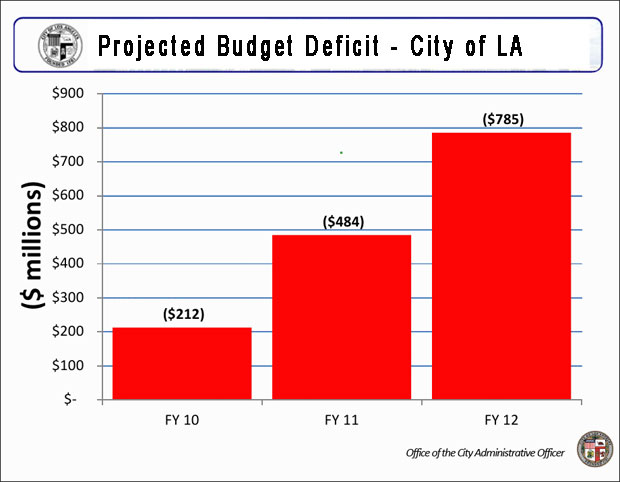Big Bucks
The Los Angeles City Council is wrestling with a budget deficit that's more than $200 million now and expected to more than triple in the next two years. As they look at laying off workers, cutting back hours at libraries, and even selling off parks and other city assets, a good deal of loathing is being directed at the Council members themselves.
It's no secret that LA Council members are among the highest-paid elected city representatives in the country. At almost $180,000, they make more than Members of Congress and many governors. Taken as a group, they employ a staff of about 320. For comparison, the White House staff is about 480.
Adding to the ire are the perks and practices that critics say allow Council members to variously flaunt the rules or feather their nests.
No Parking Problems
For instance, though the council has raised parking meter fees along streets throughout the city, council members are exempt. They can park without fear of being ticketed at any metered spot and freely walk away without slipping coins (or a credit card) into the meter.
Slush Fund?
Small potatoes, maybe. But a far bigger enchilada involves so-called member "discretionary funds." Not only does each council member get a budget of $100,000 per year to replenish this fund, which can be used pretty much any way the member wishes. But it has been the city's practice to divide the proceeds from certain city revenues with individual council members. So, if a plot of city-owned land is sold in Venice, half of the proceeds go into the general fund, and half would go to the discretionary fund of the member representing Venice.
This week City Controller Wendy Greuel released an audit showing that this sharing arrangement has contributed some $25 million to council member discretionary funds over the past twelve years. The LA Times has reported that one member alone, Westside councilman Bill Rosendahl, has amassed a fund that contains more than $4 million.
Street Furniture?
While most of the money pouring into the member's accounts comes from the sale of city-owned real estate, they also benefit from pipeline fees the city charges oil companies to pump black gold under the city streets. If pipelines run through your district, you get a taste.
Then there's the street furniture fund. No, this is not a tax on those who put couches on their front lawns. It's revenue from things like ads on bus benches or transit shelters and from facilities such as pay toilets. And this ain't pocket change. According to city budget documents, the street furniture fund generates almost $5 million a year.
For their part, Council members defend their big salaries, noting that each one represents about a quarter of a million people, and it's a 24/7 job. But it may be difficult for them to defend the practice of taking a cut of the action from city revenue, especially when it comes to land sales. In a letter to Mayor Antonia Villaraigosa, the City Controller wrote:
"It simply does not make sense that properties are acquired using money from the General Fund, yet when they are sold, the money doesn't go back to benefit the entire City. Further, there are many instances where properties were purchased when they were situated in one Council District, but because of redistricting are now located in a completely different Council District, thus the proceeds of a sale do not even benefit the original District!"
The Mayor has already indicated he'd like to at least "borrow" money from the council members individual accounts and put it in the general fund as a way of chipping away at the budget deficit. And as the city moves toward what appear to be inevitable lay-offs and other cut-backs, the issue of these discretionary funds, and of the council members pay, are sure to remain touchy topics.












